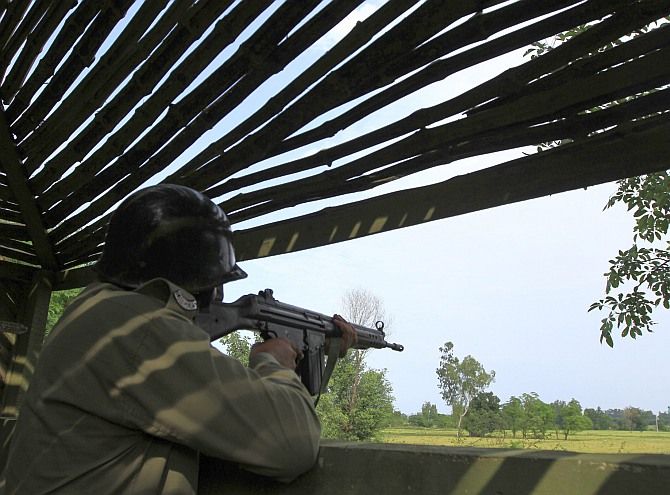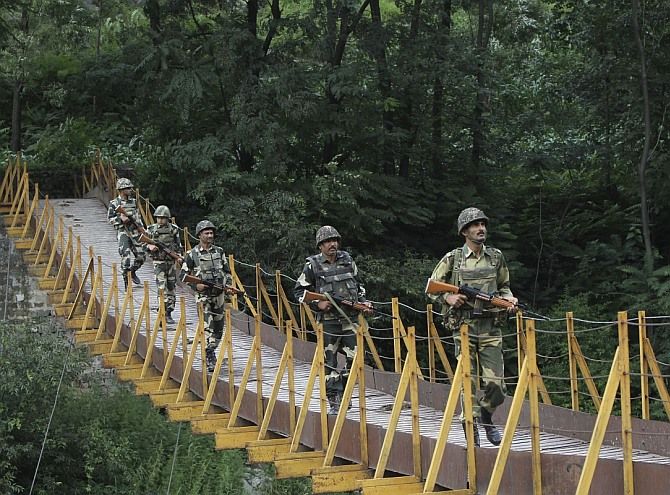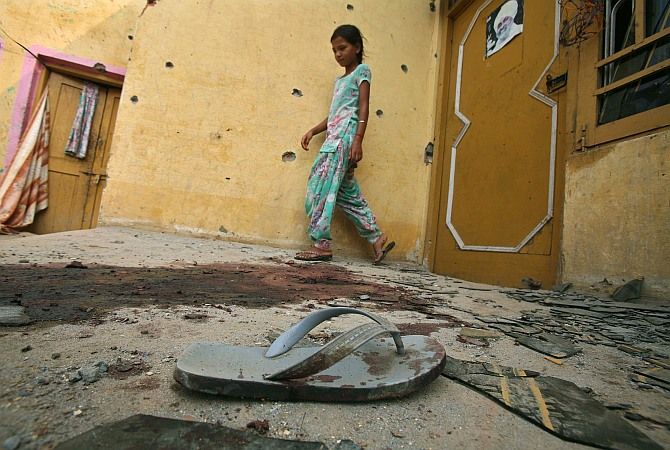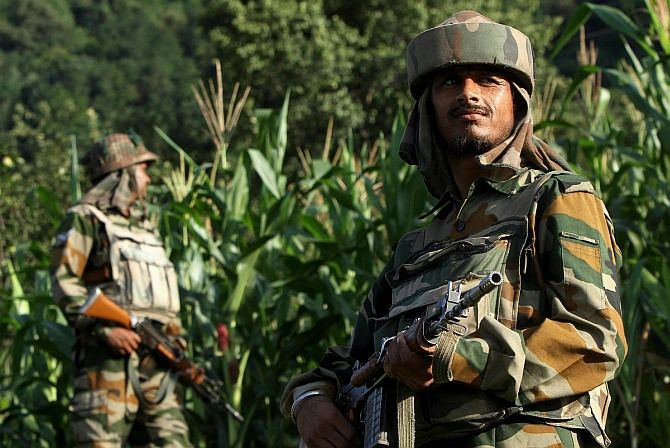The recent breach of ceasefire by Pakistan was aimed at infiltrating Lashkar-e-Tayiba cadres into Jammu and Kashmir ahead of the polls and to bring Kashmir issue back into limelight, as the neighbouring country was feeling isolated with the growing clout of India in the international forum, according to security experts.
"Here's my sense... this is about infiltration, allowing LeT and others to operate in India and take pressure off the Pakistan's domestic terror situation," renowned Strategic and International affairs expert Dr C Christine Fair, who is Assistant Professor of Peace and security studies at Georgetown University (US) said.
Dr Fair, whose book on the Pakistan army titled Fighting to the End: The Pakistan Army's way of War which is widely discussed in the military circle, feels that the recent ceasefire violations by Pakistan side could also be aimed at bringing the Kashmir issue back to headlines.
"It's also about testing Modi and of course, always trying to put Kashmir back on the headlines. But LeT has been anxious to get back to their main jihad. I think this is leading up to something horrible," she said.
The former General officer in Commanding of the Strategic Srinagar-based 15 Corps, Lt Gen Ata Hasnain (Retd), interpreted the events as an instigation of the Pakistan establishment by the India focused Jihadi groups who in the light of the advent of ISIS, Al Qaeda and Taliban, were feeling increasingly insignificant.
"To do anything meaningful in JK these groups require better leadership and more cadres, which they solely lack at present. The upcoming JK elections offer some scope for disruptive activities but for that they need more boots on ground," said Hasnain.
He said that the aim to target the International Border in the Jammu sector was to infiltrate terrorists who can attack important targets in the vicinity of the border.
"Terrorists in Pakistan seem to be desperate to replicate the incidents in Samba and Kathua wherein the infiltrators killed innocent people," Gen Hasnain said.
"Pakistani side miserably failed to gain attention on the Kashmir issue at any international forum, hence they wanted to vent out their frustration," he said.
Lt Gen Hasnain, who retired as the military secretary and had also commanded a brigade on LoC in Uri and an Infantry Division in Baramulla, said that growing clout of India in the international forum under Prime Minister Narendra Modi had further isolated Pakistan.
"They (Pakistani side) are unable to take down the success of India at the international level which increasingly makes Pakistan look insignificant, so they want to vent out their frustration and hyphenate India with Pakistan like it has happened in the past. Hence, they are firing at the LoC and IB," former Army officer said.
Hasnain is of the view that Indian Army should escalate the conflict to the levels of its choice while targeting military infrastructure, operational and strategic communication arteries across the LoC.
"The Indian Army needs to escalate it to the level of its choice while targeting military infrastructure, operational and strategic communication arteries across the LoC," General Hasnain said.
Former Jammu and Kashmir Director General of Police, M M Khajooria, said, "The failure of Nawaz Sharif to gain attention at the United Nation General Assembly was a setback for Pakistan. So they wanted to keep the pot boiling on the LoC and IB, hence they upgraded the assault not only on our security forces but also targeted the civilians."
"Our government made it clear that ceasefire violations will be made unaffordable for Pakistan. The incidents can only be avoided by punishing Pakistan for its misadventures against India," Khajooria said.
Major General Raj Mehta (retd), who was the General Officer Commanding of the strategic 19 infantry division in Baramulla, said: "Pakistan Army does not want its civil government to get anywhere close to restoring normalcy with India and develop interdependence in trade and diplomatic terms, as the debacle in 1971 and 1999 continues to haunt Pakistan Army."
He says that with more soldiers and officers getting radicalised, the hate India platform has many takers.
"Correspondingly, Nawaz Sharif is a weak PM and has been unable to establish civil dominance over the military. Pakistan Army is also annoyed at former dictator Pervez Musharraf getting targeted by the government and does not want to have him continually troubled.”
"The Pakistan Army is also annoyed at India's growing closeness with US," Major General Mehta said.
"The current provocation was the insult delivered to Pakistan Army by the new government by snubbing it repeatedly in the public space and the manner in which India is now trying to get closer to China.”
"Pakistan also wishes to take away any gains India may have made in terms of "moral" space by the manner in which it came to the assistance of the people of Kashmir during the floods," he said.
Commenting on India's response on the cross border shelling Major General Mehta said, "The response of the Army has been nuanced and low key as well as effective. The firing has been between the BSF and the Rangers with the main protagonists not getting involved."
"Media hype ignores the fact that while our civilians have been targeted, Pakistan civilians are in the same state due to BSF firing and therefore the situation is ‘no victor no vanquished…’
"India had no choice but to respond and has done so without the usual diffidence. Backroom contacts have helped restore the "uneasy" peace but the situation is on razors edge," he said.
However, General Mehta ruled out that cross border infiltration was the only reason for the ceasefire violations.









